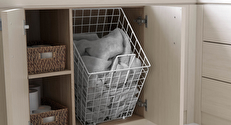
Five ways to reclaim unused space in older properties
Older properties are full of character, from high ceilings to unconventional layouts, but these features can also make furnishing and organising tricky.


It’s no secret that getting enough rest is important for your physical and mental health – from improving your memory and concentration to allowing your immune system to fight off illness or boosting your mood to help maintain positive relationships with those around you.
We don’t always find it easy, however. In fact, only 16% of Brits believe they are getting the amount of sleep they truly need. And yet there are several simple techniques that could offer the respite you’ve been searching for.
Here at Hammonds, we’re big believers of the importance of wellbeing in the home. Whether you struggle to wind down in the evening or wake up repeatedly through the night, read our tips for getting a good night’s sleep below to see if they can help you make a positive change.
Just as you might do with cooking and the kitchen, it’s believed that our brains create a strong connection between sleep and the bedroom. Is yours as sleep friendly as it could be? From light to noise and temperature, there are several tweaks you can make to create the ideal conditions.
Aim to make your bedroom as dark as possible. Blackout curtains could be particularly useful if yours is south facing. If you’re easily disturbed by noise and live near a road or busy pedestrian area, try investing in double glazing or a simple set of earplugs. You may also want to consider a new mattress if yours is uncomfortable or out of shape.
Maintaining a regular sleeping pattern can get your body and mind used to a routine. To help you drift off at a similar time night after night, try to develop a bedtime ritual by practicing relaxing behaviours. This could include reading, light stretching or listening to calming music. Taking a warm bath can also help to induce sleepiness.
Conversely, there are certain behaviours and activities that overstimulate the brain and should be avoided. Experts suggest limiting smartphone and laptop use before bed to avoid disrupting your brain’s production of the sleep hormone melatonin. You may also want to restrict TV-watching to the living room.
Do you sit up late at night worrying about what’s in store the next day? There are a handful of simple steps you can take to prepare for tomorrow and ease your worries before bed. Writing down a to-do list can take the pressure off your memory, for example. Keep this same pen and paper by your bed in case you have any other important thoughts in the middle of the night.

If you know that time is tight in the morning it could also be helpful to prepare your outfit. A fitted wardrobe interior tailored to your lifestyle will make this task a simpler one. Add a shoe rack if you have a large collection, for example, or keep your final touches easily accessible with a jewellery tray.
While all three can be enjoyed in moderation, coffee, alcohol and heavy or spicy meals can all disrupt your sleep – especially if consumed late in the evening.
Scientists advise avoiding coffee any later than 6 hours before bedtime. If you enjoy a latte in the afternoon, it may be having adverse effects on your slumber. It can also be a good idea to start cooking earlier in the evening if you’re prone to eating late. Spicy or acidic foods in particular can cause stomach issues or heartburn and keep you up.
And do you enjoy a nightcap? While an alcoholic drink before bed might help you relax, it can also disrupt your sleep cycle and leave you waking up feeling less than rested.
There are plenty of physical and mental benefits to regular exercise, including better sleep. As well as reducing anxiety and making you more tired for when you do eventually hit the hay, it’s known to increase the amount of time you spend in deep sleep. This is the stage of the sleep cycle you need to reach to adequately restore your body and mind.
The more exercise you do, the more powerful its benefits. Timing is important again, however. Rigorous exercise stimulates your body and raises your temperature, which can cause issues if done too close to bedtime.
If all else fails and you decide to see a doctor about your struggles, it’s highly likely that they’ll ask you to keep a sleep diary. Keeping a record of your daily habits and activities is an effective way to spot any patters of behaviour that could be having a detrimental effect on your sleep.
It could also help to diagnose underlying medical conditions or issues with medication. Print out this NHS example to get started – and don’t worry about giving exact answers.
Do you dream of getting a good night’s sleep? Try out these simple tips to see if you can get the rest you need. For more ideas on how to create your perfect sleeping environment, head to our interiors inspiration hub.

Older properties are full of character, from high ceilings to unconventional layouts, but these features can also make furnishing and organising tricky.

Attics are often treated as overflow storage.

Starting your day in a calm, organised bedroom helps everything else fall into place.
Whether you have an exact vision in tow, or are just at the beginning stage of your home renovation, we have heaps of inspiration for you to get stuck into.
Find a wealth of design tips, trends and inspiration in the pages of our brochure, magazine and on our blog. Our experts are always ready to help you create dream home, pop in store or book your free design visit for experts to help on bringing your vision to life.